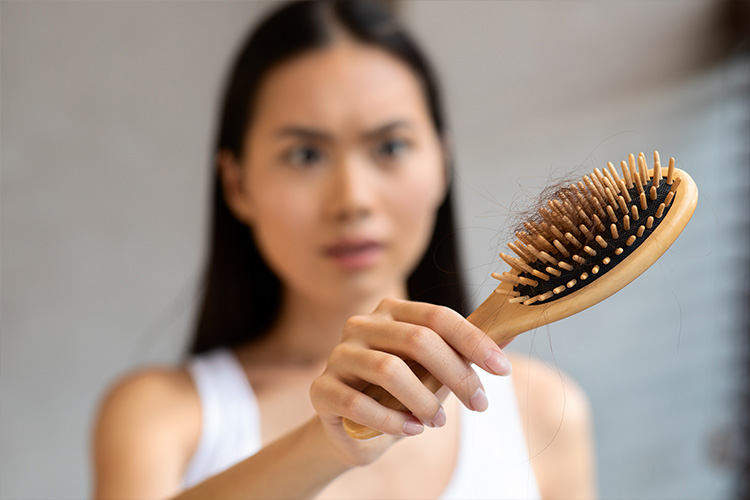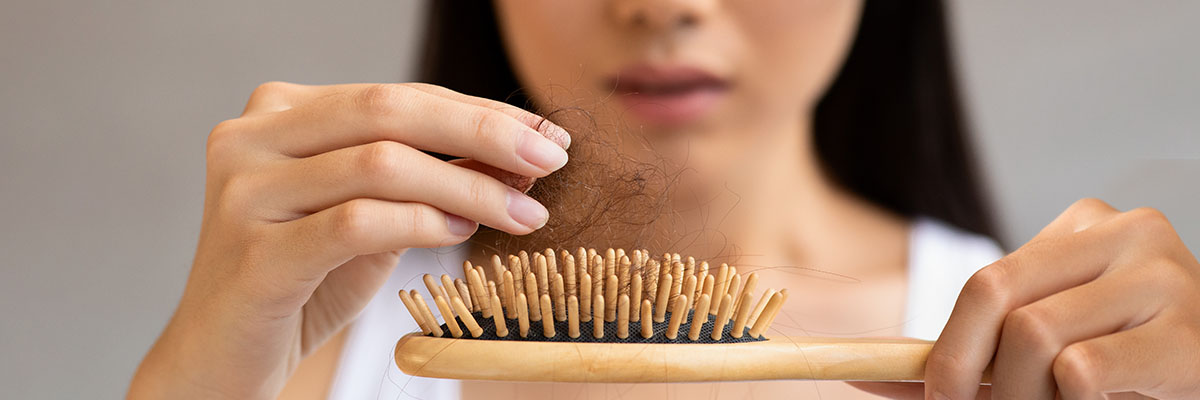Overview
Hair loss in women, also known as alopecia, is a condition characterized by thinning or loss of hair from the scalp and other areas of the body. It can present as diffuse thinning, patchy bald spots, or receding hairlines. While some hair loss is a normal part of the hair growth cycle, excessive hair shedding or noticeable thinning can indicate an underlying issue.
There are various potential causes for hair loss in women, including hormonal changes, medical conditions, medications, and stress. For some women, hair loss is a natural consequence of aging, while for others, it may be related to specific health conditions such as thyroid disorders or autoimmune diseases.
Hair loss is relatively common among adult women, with prevalence increasing with age. However, it can also affect younger women, particularly those with genetic predispositions or lifestyle factors that impact hair health. Recognizing the early signs and understanding the potential causes are crucial steps in addressing the issue effectively.
Table of Contents
Possible Causes of Hair Loss in Women

Hair loss in women can stem from various underlying factors, ranging from medical conditions to lifestyle influences. Understanding the root cause is key to effective treatment. Below is a detailed list of potential causes, how they are diagnosed, their effects on the body, and treatment options.
- Androgenetic Alopecia (Female Pattern Hair Loss). This is the most common cause of hair loss in women and is characterized by diffuse thinning over the crown of the scalp. It is hereditary and often linked to hormonal changes, such as those during menopause. Diagnosis typically involves a medical history review and scalp examination. Treatments include topical minoxidil, oral medications like spironolactone, or low-level laser therapy.
- Telogen Effluvium. This temporary form of hair loss occurs when a large number of hair follicles enter the resting phase due to stress, surgery, childbirth, or significant illness. Diagnosis is based on patient history and hair-pull tests. Recovery often happens naturally once the triggering event is resolved, but dietary improvements or stress management may accelerate regrowth.
- Alopecia Areata. This autoimmune disorder causes the immune system to attack hair follicles, leading to patchy hair loss. Diagnosis is confirmed by observing the distinctive hair loss pattern and sometimes through a biopsy. Corticosteroid injections or topical immunotherapy are common treatments to promote hair regrowth.
- Thyroid Disorders. Both hyperthyroidism and hypothyroidism can cause hair thinning or hair loss. Blood tests measuring TSH, T3, and T4 levels are used for diagnosis. Treatments involve medication to regulate thyroid hormone levels, which often leads to hair regrowth over time.
- Iron Deficiency Anemia. Low iron levels can weaken hair follicles, leading to hair loss. Diagnosis is done through blood tests assessing ferritin and hemoglobin levels. Iron supplements or dietary changes to include iron-rich foods can effectively address this issue.
- Polycystic Ovary Syndrome (PCOS). Women with PCOS often experience hair thinning due to hormonal imbalances that elevate androgen levels. Diagnosis includes blood tests for hormone levels and imaging of the ovaries. Treatments involve hormonal therapies, such as birth control pills or anti-androgens like spironolactone.
- Scalp Infections (e.g., Tinea Capitis). Fungal infections can cause hair loss and scalp scaling. Diagnosis is confirmed by examining the scalp or culturing a sample. Antifungal medications, either oral or topical, are the standard treatment.
- Medications and Treatments. Certain drugs, including chemotherapy agents, blood thinners, and antidepressants, can lead to hair loss as a side effect. Diagnosis involves reviewing the patient’s medication history. Hair typically regrows after discontinuing the offending medication under a doctor’s guidance.
- Nutritional Deficiencies. Lack of essential nutrients, such as biotin, zinc, or vitamin D, can weaken hair health. Blood tests are used for diagnosis. Adjusting diet or taking supplements tailored to the deficiency can restore hair growth.
- Traction Alopecia. Hair loss caused by tight hairstyles that stress hair follicles. Diagnosis is based on the patient’s styling habits and scalp condition. Changing hairstyles and reducing tension on the hair can prevent further damage and allow regrowth.
Each of these causes requires tailored approaches to diagnosis and treatment. Early intervention can significantly improve outcomes, particularly when the underlying cause is identified and addressed promptly.
Conditions Associated with Hair Loss in Women
Hair loss in women is often linked to specific medical conditions that can impact overall hair health. Understanding these conditions and how they contribute to hair loss can guide proper diagnosis and treatment. Below is a list of conditions commonly associated with hair loss, how they affect the body, and treatment approaches.
- Androgenetic Alopecia (Female Pattern Hair Loss). This hereditary condition is linked to genetic and hormonal factors, leading to progressive hair thinning primarily over the crown and parting of the scalp. Treatments include minoxidil, oral anti-androgens like spironolactone, and hair transplant procedures.
- Telogen Effluvium. This condition results in excessive shedding due to stress, illness, or hormonal changes. It occurs when more hairs than usual enter the resting phase of the hair growth cycle. Managing the underlying trigger, improving nutrition, and reducing stress can facilitate recovery.
- Alopecia Areata. An autoimmune disorder where the immune system attacks hair follicles, causing sudden, patchy hair loss. It can progress to total scalp or body hair loss in severe cases. Treatment involves corticosteroid injections, topical treatments, or immunotherapy to stimulate hair regrowth.
- Thyroid Disorders (Hypothyroidism and Hyperthyroidism). Imbalances in thyroid hormones can disrupt the hair growth cycle, leading to thinning or shedding. Correcting hormone levels through thyroid medication can reverse hair loss over time.
- Polycystic Ovary Syndrome (PCOS). Elevated androgen levels in women with PCOS can lead to hair thinning on the scalp while promoting unwanted hair growth in other areas. Hormonal therapy, such as birth control pills or anti-androgens, is the primary treatment.
- Lupus. This autoimmune condition often leads to inflammation and scarring of the scalp, resulting in permanent hair loss in some cases. Early diagnosis and treatment with corticosteroids or immunosuppressive drugs can minimize damage.
- Scalp Psoriasis. This inflammatory skin condition can cause scaling, itching, and hair loss due to irritation or scratching. Treatments include medicated shampoos, topical corticosteroids, and phototherapy.
- Seborrheic Dermatitis. A chronic condition causing scalp inflammation and flaking, which may result in temporary hair thinning. Medicated shampoos with ketoconazole or selenium sulfide and anti-inflammatory treatments can address symptoms.
- Cushing’s Syndrome. Excessive cortisol levels can disrupt hair growth, leading to thinning. Treating the underlying condition, such as through medication or surgery, often restores hair health.
- Diabetes Mellitus. Poor circulation and high blood sugar levels can damage hair follicles, resulting in hair loss. Managing blood sugar levels with medication, diet, and exercise can help prevent further hair loss.
Each of these conditions can contribute to hair loss in different ways. Accurate diagnosis and prompt treatment are critical in addressing hair loss effectively and maintaining overall health.
When to See a Doctor
Hair loss in women can be distressing, but not all cases require immediate medical attention. However, certain signs and patterns may indicate underlying health issues that need professional evaluation. Here’s when you should consider seeing a doctor for hair loss and what to expect during the process.

When to Seek Medical Advice
- Sudden or Severe Hair Loss. If you experience rapid shedding or bald patches, it could signal conditions like alopecia areata or telogen effluvium that require treatment.
- Thinning Hair Over Time. Progressive thinning on the scalp or widening of your part may indicate androgenetic alopecia, which is treatable with early intervention.
- Hair Loss Accompanied by Other Symptoms. Symptoms like fatigue, weight changes, or scalp irritation could point to thyroid issues, autoimmune disorders, or infections.
- Unexplained Hair Loss. If you’re losing hair without an identifiable cause, a doctor can perform tests to determine potential underlying issues, such as nutritional deficiencies or hormonal imbalances.
- Scalp Pain or Itching. These symptoms may indicate a skin condition, such as psoriasis or a fungal infection, requiring prompt treatment.
What Type of Doctor to Seek
- Dermatologist. A dermatologist specializes in hair and scalp conditions and is often the best first point of contact for hair loss concerns.
- Endocrinologist. If your hair loss is linked to hormonal imbalances, such as thyroid disorders or PCOS, an endocrinologist may be consulted.
- Primary Care Physician. For general health assessments, a primary care doctor can help identify systemic issues contributing to hair loss and refer you to a specialist if necessary.
What to Expect From Your First Doctor Visit
During your first appointment, the doctor will:
- Review Your Medical History. This includes understanding your hair loss pattern, family history of hair loss, and any associated symptoms.
- Examine Your Scalp and Hair. The doctor may check for signs of inflammation, scaling, or hair follicle damage.
- Order Diagnostic Tests. These may include blood tests to check for thyroid function, iron levels, or hormonal imbalances. A scalp biopsy might be performed in rare cases.
- Discuss Treatment Options. Based on the diagnosis, the doctor will recommend a personalized treatment plan, which may involve medications, lifestyle changes, or other therapies.
Seeking medical advice at the right time can help prevent further hair loss and identify any underlying health conditions that need attention. Early diagnosis and treatment are key to achieving the best outcomes.
Hair Loss in Women FAQs
Hair loss in women can be a distressing experience, raising numerous questions about its causes, treatments, and prevention. To help address these concerns, this FAQ section provides clear and concise answers to the most common questions related to hair loss in women. Whether you’re seeking insights into potential triggers, effective remedies, or when to seek medical advice, these answers aim to guide you through this challenging condition.
- What are the most common causes of hair loss in women?
Common causes include androgenetic alopecia, telogen effluvium, alopecia areata, thyroid disorders, and nutritional deficiencies. Lifestyle factors, such as stress and certain hairstyles, can also contribute. - Can hair loss in women be reversed?
In many cases, hair loss can be reversed or managed effectively, especially if the cause is identified and treated early. Treatments like minoxidil, dietary changes, and addressing hormonal imbalances often yield positive results. - Is hair loss in women normal as they age?
Yes, age-related hair thinning is common, particularly after menopause, due to hormonal changes. This condition is often a form of androgenetic alopecia and can be treated to slow its progression. - Does stress cause hair loss in women?
Yes, stress can trigger telogen effluvium, a temporary form of hair loss that occurs when a large number of hair follicles enter the resting phase. Reducing stress typically helps hair regrow. - What role do hormones play in hair loss?
Hormonal imbalances, such as those caused by thyroid disorders, PCOS, pregnancy, or menopause, can disrupt the hair growth cycle, leading to thinning or shedding. - What treatments are available for hair loss in women?
Treatments include topical medications like minoxidil, oral anti-androgens, corticosteroid injections, low-level laser therapy, and addressing underlying causes such as thyroid issues or iron deficiency. - Can diet affect hair loss?
Yes, a poor diet lacking essential nutrients like iron, zinc, vitamin D, and biotin can contribute to hair loss. A balanced diet or appropriate supplements can improve hair health. - When should I see a doctor for hair loss?
You should see a doctor if you experience sudden or severe hair loss, hair loss with other symptoms like fatigue or scalp pain, or if the hair loss worsens over time without an obvious cause. - What tests might a doctor perform for hair loss?
Doctors may order blood tests to check for thyroid function, iron levels, and hormones. Scalp examinations and biopsies might be done in some cases. - Can hair loss in women be prevented?
Preventive measures include maintaining a healthy diet, avoiding excessive heat or harsh chemicals on hair, managing stress, and avoiding tight hairstyles that pull on the scalp.
Understanding the causes and management of hair loss in women is essential for addressing the issue effectively. If you still have unanswered questions or suspect an underlying medical condition, consult a healthcare professional for a personalized evaluation and treatment plan. Remember, early intervention can make a significant difference in preventing further hair loss and promoting healthy regrowth.


